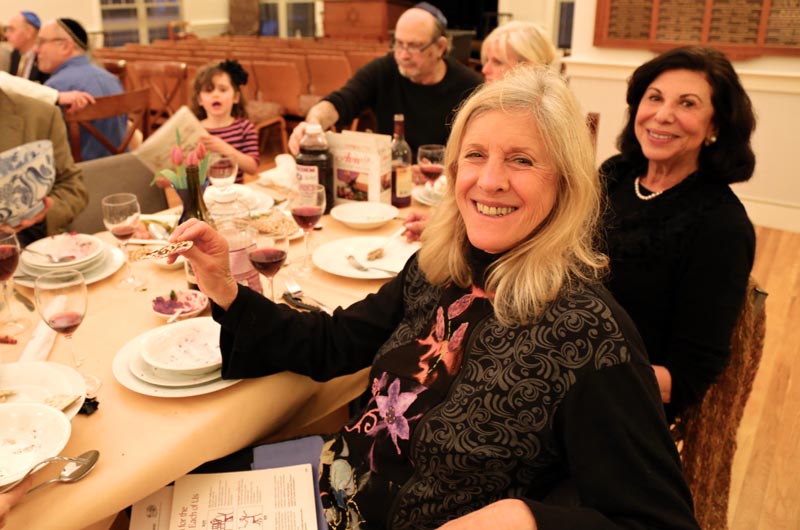It was a night different from all others, a night of stories, questions, and special rituals.
The Hebrew Center swelled with 120 people Tuesday evening, as Martha’s Vineyard joined Jews everywhere in celebrating the second night of Passover.
Passover is an eight-day holiday in the Jewish tradition celebrated to honor the exodus from Egypt. The Hebrew word seder means order, so the Passover meal follows a prescribed set of steps, starting with the first of four glasses of wine and culminating, traditionally, in song.
Jews all over the world follow generally the same order, while enhancing the celebration with their own customs, cultural and personal both.
It’s typical for Jews to tell the story of Moses and the exodus from Egypt during the seder, but on Tuesday three members of the congregation instead shared personal stories of freedom.
Miklos Breuer told the story of how his family had hidden from the Germans in Hungary during World War II.
That experience brings special meaning to the holiday of Passover, he said.
“Being able to say what I want without fear is one of the greatest assets I have,” Mr. Breuer said.
Another congregant, Anita Hotchkiss, was a child when her family was brought from Poland to a labor camp in Siberia. They worked there until 1946, before returning to Poland, where religious oppression still dominated the society.
Following Israel’s independence, her family left Poland for Israel.
“Like the Jews from Egypt, we had a very short time to pack, and were only allowed to bring one suitcase each,” she said. “That was the beginning of our journey to freedom.”
Bizu Horwitz spoke about traveling with his mother in Israel.
“Freedom isn’t easy,” he told the crowd. “You have to work for it.”
Central to the Passover ritual is the asking of questions, big and small. It’s a tradition led by the community’s youngest members who sing a song full of questions called Ma Nishtanah. “Why is this night different?” four children sang in chorus Tuesday evening. “On all nights we eat leavened or unleavened bread, and on this night only matzah?”
The song contains four central questions, but it’s customary to ask many other questions, a central component of Jewish practice.
Rabbi Caryn Broitman asked why asking questions was important.
“Because then you learn something,” a child offered.
“Being able to ask a question is a form of liberation,” a woman said. “Then you are on equal footing.”
The traditional holiday food, carted in a truck from Brookline, included round matzo, or unleavened bread, gefilte fish, chopped liver and potato kugel.
Attendees also enjoyed matzo ball soup and beef brisket.
The evening concluded with song, most boisterously the popular tune Chad Gadya, or One Little Goat. Rabbi Broitman assigned a sound effect to each table at the seder.
When three hours had passed, the participants made their way, schmoozing and humming Passover tunes into the rainy night.







Comments
Comment policy »